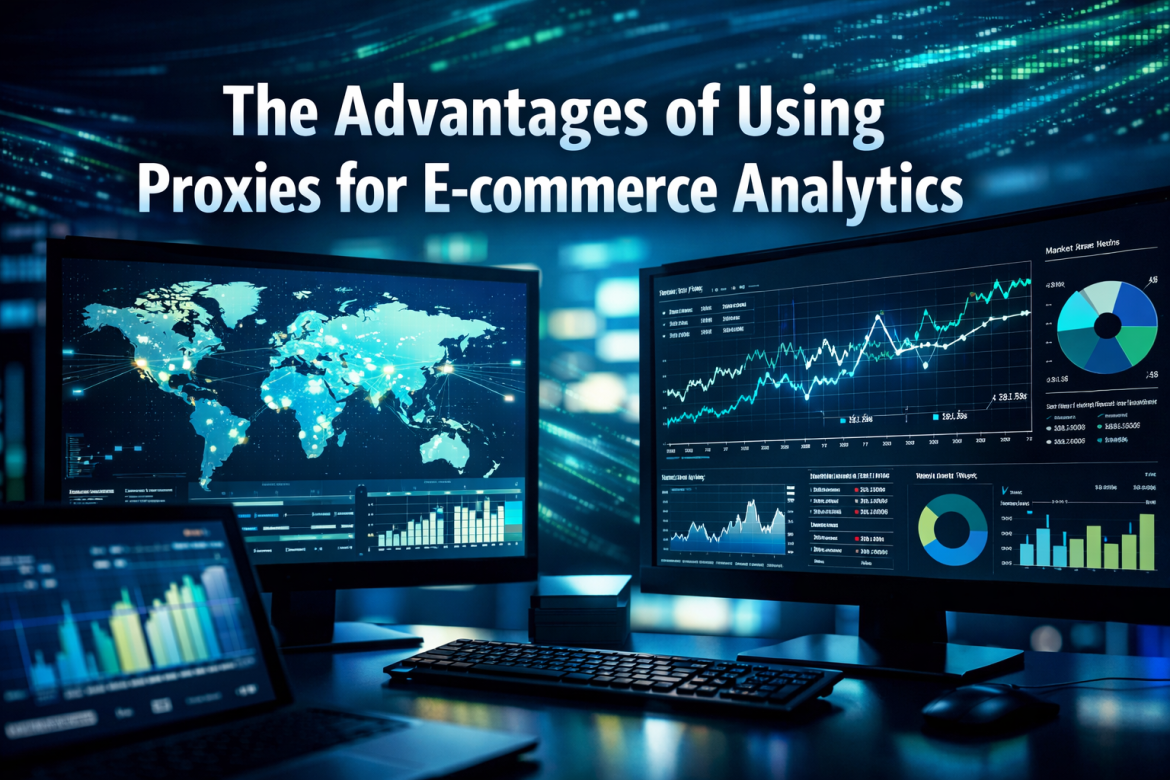Table of Contents
In the cutthroat world of 2026 e-commerce, merely having a product is no longer enough; success hinges on the strategic mastery of data. Imagine navigating a vast ocean without a map or compass – that’s what operating an e-commerce business without robust analytics feels like. Businesses today face an uphill battle against geo-restrictions and sophisticated anti-bot measures that shroud critical market intelligence. These digital barriers prevent access to vital information, such as competitor pricing, regional product availability, and nuanced customer preferences across diverse markets. Without a reliable mechanism to pierce through these digital veils, e-commerce enterprises risk making decisions in the dark, leading to missed opportunities and stagnant growth. This is precisely where Proxies for E-commerce Analytics emerge as an indispensable tool, offering a powerful conduit for businesses to gather the precise, actionable data needed to thrive in a hyper-competitive landscape. By routing internet traffic through intermediary servers, proxies effectively bypass these restrictions, enabling businesses to collect data from virtually any location, anonymously and efficiently.
Key Takeaways
- 🌍 Bypass Geo-Restrictions & Anti-Bot Measures: Proxies are essential for overcoming digital barriers, allowing access to location-specific data crucial for market analysis and competitor monitoring.
- 💰 Enhanced Market & Competitor Analysis: Gain real-time insights into competitor pricing, product availability, and promotional strategies across various regions, enabling agile pricing and inventory decisions.
- 📊 Improved Ad Verification & Fraud Prevention: Ensure advertising campaigns are correctly displayed to the intended audience in different geographies, preventing ad fraud and optimizing marketing spend.
- 🚀 Boosted Web Scraping Efficiency: Collect large volumes of data without IP blocking or rate limiting, ensuring continuous and comprehensive data acquisition for market intelligence.
- 📱 Deeper Mobile Experience Insights: Mobile proxies offer unique advantages for understanding mobile user behavior, optimizing mobile SEO, and tracking mobile ad campaigns for targeted engagement.
Understanding Proxies in E-commerce Analytics
Proxies serve as an intermediary between a user’s device and the internet, masking the user’s IP address and routing their online activities through a different server. This allows the user to appear as though they are accessing the internet from a different location, which can be particularly useful for e-commerce businesses seeking to gather data from specific regions or markets. There are several types of proxies available, including data center proxies, residential proxies, and mobile proxies, each with its own set of advantages and use cases.
In the context of e-commerce, proxies are invaluable for bypassing geo-restrictions and accessing location-specific data. For example, a business in the United States might use a proxy server in Europe to monitor the pricing and availability of products on European e-commerce sites. This allows the business to stay competitive by adjusting its pricing strategy based on real-time market data. Additionally, proxies can help e-commerce companies avoid IP blocking and rate limiting when scraping large volumes of data from multiple sources, ensuring that they can collect the information they need without interruptions.
Proxies are not only about gathering data but also about ensuring the integrity and accuracy of that data. By using proxies to simulate user behavior from different locations, businesses can verify the accuracy of online advertisements, ensuring that their ads are being displayed correctly to the intended audience. This is especially important in an era where ad fraud is a growing concern, with businesses losing billions of dollars each year due to fraudulent clicks and impressions.
The role of proxies for e-commerce analytics extends beyond mere data collection; it’s about strategic market positioning. Imagine a global retailer wanting to launch a new product line in Japan. Without proxies, they might only see general market trends. With proxies, they can access local Japanese e-commerce sites, see competitor pricing for similar products, understand local consumer preferences, and even observe how local ads are displayed. This level of granular insight is impossible without the ability to simulate a local user. This capability is not just an advantage; it’s a necessity for any e-commerce business aiming for global relevance and localized precision in 2026.
Beyond competitor analysis, proxies empower businesses to perform robust A/B testing across different geographical demographics. A product page that performs well in North America might not resonate with customers in Southeast Asia. By using proxies to simulate user visits from various regions, businesses can observe loading times, content rendering, and user interaction, identifying areas for optimization tailored to specific audiences. This proactive approach to user experience enhancement, facilitated by proxies for e-commerce analytics, directly contributes to higher conversion rates and customer satisfaction.
Furthermore, compliance with international data regulations, such as GDPR in Europe or CCPA in California, is becoming increasingly complex. While proxies are used for data collection, they also play a role in understanding how a business’s own website appears to users under different regulatory frameworks. By simulating access from various regions, companies can verify that their privacy policies and data consent mechanisms are correctly displayed and compliant with local laws, mitigating legal risks and building trust with their global customer base. The versatility and strategic importance of proxies in 2026 e-commerce analytics cannot be overstated.
Key Advantages of Using Proxies for E-commerce Analytics
One of the most significant advantages of using proxies in e-commerce analytics is the ability to conduct accurate market and competitor analysis. By routing traffic through proxies, businesses can gather real-time data on competitors’ pricing, product availability, and promotional strategies. This information is crucial for making informed decisions about pricing, inventory management, and marketing efforts. For example, a business can use proxies to track competitor prices across different regions, allowing them to adjust their pricing strategies to remain competitive.
In addition to market analysis, proxies are essential for improving ad verification. By using proxies to simulate user behavior from different geographic locations, businesses can ensure that their ads are being displayed correctly and reaching the intended audience. This is particularly important for global e-commerce companies that run advertising campaigns across multiple regions. By verifying ads from the perspective of users in different locations, businesses can prevent ad fraud, which occurs when ads are served to bots or low-quality traffic instead of genuine users.
Proxies also enhance web scraping efficiency, allowing businesses to collect large amounts of data from multiple sources simultaneously without being blocked. Web scraping is a common practice in e-commerce for gathering data on competitors, market trends, and customer reviews. However, many websites implement measures to prevent excessive scraping, such as rate limiting or IP blocking. By using proxies, businesses can distribute their scraping requests across multiple IP addresses, reducing the risk of detection and ensuring that they can collect the data they need.
Another key advantage of proxies is their ability to provide better customer experience insights. By using proxies to gather data on customer behavior from different regions, businesses can tailor their marketing strategies to meet the needs and preferences of specific audiences. For example, a business might use proxies to analyze how customers in different countries interact with their website, allowing them to optimize the user experience for different markets. This can lead to higher conversion rates and increased customer satisfaction.
- Competitive Intelligence at Your Fingertips: Imagine launching a new line of activewear. With proxies for e-commerce analytics, you can instantly check how competitors are pricing similar items in Paris, London, and New York. This immediate, localized insight allows for dynamic pricing adjustments that keep you ahead of the curve.
- Geolocation-Specific Product Research: Before expanding a product line, it’s vital to understand regional demand. Proxies enable you to browse marketplaces as if you were physically present in that country, revealing local bestsellers, emerging trends, and product gaps. This foresight minimizes risk and maximizes potential.
- Unbiased Review Monitoring: Customer reviews are gold. Proxies allow you to scrape reviews from various regional versions of marketplaces or review sites, ensuring you capture an unfiltered, global perspective on your products and those of your competitors. This helps in understanding sentiment and identifying areas for improvement.
- Catalog and Inventory Management: For businesses with international shipping or multiple regional warehouses, proxies can help monitor product availability on third-party platforms or competitor sites. This assists in optimizing inventory levels and ensuring products are stocked where demand is highest.
- Fraud Detection and Prevention: Beyond ad verification, proxies can be used to monitor for fraudulent activities on your own platform by simulating different user profiles and identifying suspicious patterns that might indicate bots attempting to exploit promotions or create fake accounts.
- SEO Monitoring for Global Reach: Search engine results vary significantly by location. Proxies allow e-commerce businesses to track their search rankings and those of their competitors in specific countries or even cities. This crucial SEO insight helps in optimizing content and keywords for maximum regional visibility.
- Market Trend Spotting: By regularly scraping data from diverse geographical markets through proxies, businesses can identify nascent trends before they become mainstream. This allows for proactive product development and marketing, giving them a significant first-mover advantage.
- Localized Content Optimization: Understanding how your website and product descriptions appear in different languages and cultural contexts is vital. Proxies enable visual verification of localized content, ensuring messaging is accurate, culturally appropriate, and resonates with the target audience.
- API Rate Limit Bypassing: When integrating with various e-commerce platforms or data providers, API rate limits can hinder rapid data collection. A sophisticated proxy network allows requests to be distributed, effectively bypassing these limitations and accelerating data acquisition.
- Dynamic Pricing Strategy Implementation: For businesses employing dynamic pricing, proxies are indispensable. They provide the real-time competitor data needed to instantly adjust prices based on market fluctuations, demand, and competitor moves, maximizing revenue and maintaining competitiveness.
These advantages collectively paint a clear picture: proxies for e-commerce analytics are not just a technical accessory but a foundational element for data-driven strategy in 2026. They empower businesses with the agility and insight needed to navigate complex global markets and make truly informed decisions.
| Feature | Without Proxies | With Proxies |
|---|---|---|
| Market Analysis | Limited to accessible regions, often outdated | Real-time, global competitor pricing & product availability |
| Ad Verification | Assumed, prone to ad fraud | Verified ad display in specific regions, reduced fraud risk |
| Web Scraping | Prone to IP blocks, rate limiting, slow | Efficient, large-scale data collection, uninterrupted |
| Customer Experience | General insights, not localized | Tailored strategies based on regional user behavior, higher conversions |
| Geo-Restrictions | Significant barrier to data access | Bypassed, enabling access to region-specific content |
| Mobile Insights | Limited understanding of mobile-specific data | Deep understanding of mobile user behavior, localized mobile SEO |
| Competitor Monitoring | Difficult to track dynamic changes across regions | Continuous, anonymous monitoring of competitor strategies globally |
| Localized SEO | Challenging to verify international rankings | Accurate tracking of search rankings across different countries/cities |
| Product Research | Restricted view of international product demand | Comprehensive insights into localized product trends and gaps |
| API Rate Limits | Can hinder rapid data acquisition | Requests distributed, effectively bypassing limitations |
| Data Integrity | Risk of inaccurate data due to blocks | Enhanced data accuracy by simulating real user access |
Exploring Mobile Proxy Options
As mobile devices become the primary means of accessing the internet for many consumers, e-commerce businesses must adapt their strategies to account for this shift. Mobile proxies offer a unique advantage in this regard, allowing businesses to gather data that reflects the behavior of mobile users more accurately. Unlike traditional proxies, which route traffic through fixed IP addresses, mobile proxies use IP addresses assigned to mobile devices by cellular networks. This makes mobile proxies more difficult to detect and block, providing businesses with greater anonymity and access to mobile-specific content.
One of the key benefits of mobile proxies is their ability to simulate mobile user behavior, which is essential for tasks such as localized SEO monitoring and mobile app testing. For example, a business might use mobile proxies to track how its website ranks on search engines in different regions when accessed from mobile devices. This information can be used to optimize the website for mobile search results, improving visibility and driving more traffic from mobile users.
Mobile proxies are also valuable for tracking mobile advertising campaigns. As more consumers use mobile devices to browse the internet and make purchases, businesses are increasingly investing in mobile advertising. However, verifying the effectiveness of these ads can be challenging, especially when ads are targeted to specific regions or demographics. By using mobile proxies, businesses can monitor how their ads are being served to mobile users in different locations, ensuring that their campaigns are reaching the right audience.
Exploring mobile proxy options presents unique advantages for e-commerce analytics, allowing businesses to access mobile-specific content and gain deeper insights into customer behavior on mobile devices. Consider the scenario of a fashion retailer launching a mobile-first campaign. With mobile proxies, they can monitor how their banner ads appear on various mobile devices and operating systems in different cities, checking for display errors or slow loading times that could deter potential customers. This granular control over mobile ad verification is paramount in 2026, where a significant portion of e-commerce transactions originates from mobile.
Furthermore, mobile proxies are indispensable for mobile app market research. If you’re developing an e-commerce app, understanding the competitive landscape within app stores in various regions is critical. By simulating mobile users in different countries, you can analyze app rankings, review sentiments, and even observe in-app purchasing flows of competitor apps without being flagged. This directly informs your app’s feature set, marketing strategy, and localization efforts, ensuring it resonates with target users globally.
The power of mobile proxies also extends to dynamic pricing in a mobile context. Many e-commerce platforms and airlines show different prices based on the device type used for access. By using mobile proxies, businesses can accurately track these mobile-specific price variations, ensuring their own dynamic pricing strategies are optimized for mobile users. This prevents leaving money on the table or losing customers due to uncompetitive mobile pricing. This nuanced understanding of the mobile marketplace, facilitated by proxies for e-commerce analytics, is a game-changer for businesses aiming for holistic market dominance.
In a world where mobile internet usage continues to outpace desktop, the insights derived from mobile proxies are non-negotiable for informed decision-making. They provide an authentic lens into the mobile customer journey, from initial search to final purchase, enabling businesses to fine-tune every touchpoint for maximum effectiveness. This ensures not just competitive advantage, but a deeply personalized and optimized experience for the ever-growing mobile consumer base.
Challenges and Considerations
While the benefits of using proxies for e-commerce analytics are clear, there are also challenges and considerations that businesses must keep in mind. One of the primary concerns is the cost associated with using proxies, particularly mobile proxies, which can be more expensive than other types of proxies. Businesses must carefully evaluate their budget and resource allocation to ensure that they are getting the most value from their proxy investments. The initial outlay for a robust proxy network, especially one encompassing residential and mobile IPs, can be substantial, and ongoing subscription costs need to be factored into operational budgets. Therefore, a clear return on investment (ROI) calculation is crucial before committing to a proxy solution.
Another important consideration is the legal and ethical implications of using proxies. While proxies are a powerful tool for data collection, businesses must ensure that they are using them in compliance with applicable laws and regulations. This includes respecting the terms of service of websites being scraped and avoiding practices that could be considered unethical, such as gathering data from competitors in a way that violates their intellectual property rights. Ignorance of these regulations is no defense, and breaches can lead to significant legal penalties, reputational damage, and financial losses. It’s imperative to consult legal counsel to ensure all data collection activities, even those facilitated by proxies for e-commerce analytics, adhere to local and international laws.

Technical complexity is another hurdle. Implementing and managing a large-scale proxy infrastructure requires technical expertise. Businesses need to consider the resources available for proxy rotation, IP health monitoring, and integrating proxies with their existing analytics and scraping tools. Poorly managed proxies can lead to inefficient data collection, compromised data quality, and even IP bans, rendering the investment useless.
The quality and reliability of proxy providers vary significantly. Choosing a reputable provider that offers clean, fast, and stable IPs is paramount. Low-quality proxies can result in slow speeds, frequent disconnections, and easily detectable IP addresses, undermining the very purpose of using proxies. Businesses should look for providers with strong uptime guarantees, a large pool of diverse IPs, and excellent customer support.
Finally, the dynamic nature of anti-bot technologies means that even the best proxy networks require continuous monitoring and adaptation. Websites constantly update their defenses, and what works today might not work tomorrow. This necessitates an ongoing commitment to staying informed about the latest anti-bot measures and adjusting proxy strategies accordingly. This continuous arms race adds another layer of operational complexity and cost.
Despite these challenges, the strategic advantages offered by proxies for e-commerce analytics often outweigh the complexities, provided businesses approach their implementation with due diligence, legal awareness, and a clear understanding of their specific data needs.
Conclusion
In the rapidly evolving world of 2026 e-commerce, staying competitive requires access to accurate and actionable data. Proxies offer a powerful solution for overcoming the challenges associated with data collection, allowing businesses to gather information from multiple sources without being detected. By exploring mobile proxy options, e-commerce businesses can gain deeper insights into mobile user behavior, optimize their advertising campaigns, and ensure that their data-driven decisions are based on accurate and reliable information. From meticulous competitor analysis and robust ad verification to efficient web scraping and profound customer experience insights, the strategic use of proxies for e-commerce analytics empowers businesses to navigate the complexities of global digital markets with confidence and precision.
The ability to bypass geo-restrictions and sophisticated anti-bot measures is no longer a luxury but a fundamental requirement for any e-commerce enterprise aiming for comprehensive market intelligence. As businesses continue to expand their global footprint, understanding localized market nuances, pricing sensitivities, and consumer preferences becomes critical. Proxies provide the necessary infrastructure to achieve this granularity, ensuring that marketing campaigns are targeted, product offerings are relevant, and pricing strategies are competitive across all regions.
For businesses looking to thrive in 2026, the next step is to carefully evaluate their data collection needs and invest in a reliable proxy solution. This includes selecting a reputable provider, understanding the different types of proxies available (with a strong consideration for mobile proxies given current market trends), and ensuring compliance with all legal and ethical guidelines. By strategically integrating proxies into their analytics framework, e-commerce businesses can unlock unparalleled insights, drive innovation, and ultimately secure a formidable competitive edge in the dynamic digital marketplace.
Actionable Next Steps:
- Assess Your Data Needs: Clearly define what data you need, from which regions, and for what purpose (e.g., competitor pricing, localized SEO, mobile app testing).
- Research Proxy Providers: Investigate reputable proxy providers, focusing on those offering diverse IP pools (residential, mobile), high uptime, and strong customer support.
- Start Small, Scale Up: Begin with a pilot project using proxies for a specific analytics task to understand their effectiveness and integration challenges before scaling up.
- Prioritize Legal & Ethical Compliance: Consult legal experts to ensure all data collection activities using proxies adhere to international data privacy laws and website terms of service.
- Train Your Team: Ensure your analytics and marketing teams are proficient in using proxies and interpreting the data gathered through them.
- Monitor & Adapt: Continuously monitor the performance of your proxy network and stay informed about evolving anti-bot technologies to maintain effective data access.
By embracing the power of proxies for e-commerce analytics, businesses in 2026 are not just collecting data; they are strategically positioning themselves for unparalleled growth and market leadership.
Frequently Asked Questions about Proxies for E-commerce Analytics
Q: What are proxies and why are they crucial for e-commerce analytics?
Q: How do proxies help with competitor analysis in e-commerce?
Q: What are the benefits of using mobile proxies specifically for e-commerce?
Q: Are there any ethical or legal considerations when using proxies for data collection?
How to Integrate Proxies for E-commerce Analytics: A Step-by-Step Guide
Step 1: Define Your Data Objectives 🎯Clearly identify what type of e-commerce data you need to collect (e.g., competitor pricing, product reviews, localized search rankings) and from which geographical regions. This will guide your proxy selection.
Step 2: Choose the Right Proxy Type 🛡️Based on your objectives, select the most suitable proxy type. For general web scraping, data center proxies might suffice. For high-anonymity, geo-specific, or mobile-specific data, residential or mobile proxies are often superior. Consider factors like cost, speed, and detection risk.
Step 3: Select a Reputable Proxy Provider ✅Research and choose a provider known for offering clean, stable, and fast IPs, a large IP pool, and good customer support. Look for transparent pricing and clear terms of service.
Step 4: Configure Your Tools and Software ⚙️Integrate your chosen proxies with your web scraping tools, analytics platforms, or custom scripts. Most scraping frameworks (like Scrapy or BeautifulSoup) and browser automation tools (like Selenium or Playwright) support proxy configuration. Ensure proper rotation and session management.
Step 5: Test and Monitor Performance 🧪Begin with small-scale data collection to test the proxy setup. Monitor IP block rates, data accuracy, and speed. Continuously refine your proxy rotation strategy and user-agent settings to optimize efficiency and minimize detection.
Step 6: Ensure Legal and Ethical Compliance ⚖️Regularly review your data collection practices against current laws (e.g., GDPR, CCPA) and website terms of service. Adapt your strategies to ensure all data acquisition remains legal and ethical.
Q&A on E-commerce Analytics with Proxies
Q: How reliable are the data insights obtained using proxies for e-commerce analytics?
Q: Can proxies really help in preventing ad fraud?
Q: What’s the main difference between residential and data center proxies for e-commerce?
Key Terminology: Proxies for E-commerce Analytics
**Proxy Server**
**Residential Proxy**
**Mobile Proxy**
**Geo-Restriction**
**Web Scraping**
Recommended Software Application: Proxy Manager Pro for E-commerce
Proxy Manager Pro
An advanced proxy management software designed specifically for e-commerce businesses to streamline their data collection efforts. It offers intuitive IP rotation, geographic targeting, and seamless integration with popular scraping frameworks.
Publisher: Analytics Solutions Inc.
Version: 3.2.1
Operating System: Windows, macOS, Linux
Category: Data Analytics, Proxy Management
Rating: ⭐⭐⭐⭐⭐ (4.8/5 based on 250 reviews)
Features: Automated IP rotation, Geo-targeting by country/city, Session management, Blacklist/Whitelist management, Detailed usage analytics, API for custom integrations.
Official Website: www.proxymanagerpro.com









